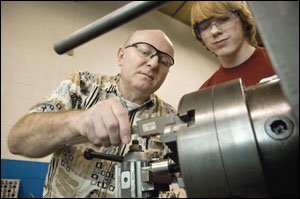
Tom Clemans never planned to become a precision-machining instructor. Twenty-five years ago, he spotted a help-wanted sign outside a machine shop, wandered in, and took a job sweeping floors. Clemans was immediately fascinated by the trade, which involves cutting and shaping metal or plastic into parts for airplanes, cars, and other machines. He learned by watching, by reading textbooks from the library, and, eventually, by practicing the trade himself.
Now in his 15th year of teaching at Sno-Isle TECH Skills Center in Everett, Washington, Clemans has another use for the trade—as a way to get kids interested in algebra, geometry, and trigonometry.
Clemans’ students, who are almost always all boys, spend half the day at local high schools and ride buses to Sno-Isle for sessions in Clemans’ shop. “Machining is the hook that gets them in here,” he says. “I used to sneak math into it. I don’t anymore. I just tell them, ‘This is math you can do.’”
Clemans, who is writing a machining textbook, knows how intimidating math can be: He failed college trigonometry twice. That’s why he works hard to make abstract concepts seem concrete and relevant.
“He gave us the basic information we needed,” says Joseph Alonso, a 2005 graduate who now works as a night manager in a machine shop. “But for the most part, he lets his students really go out there and try the stuff for themselves.”
When one student who was particularly wary of math wanted to make a bicycle sprocket, Clemans gave him a partial sketch. The boy then calculated the diameter, located tangent points between arcs, figured out various lengths—and built the sprocket.
“Many people, including academic teachers and counselors, think vocational education is for dummies,” Clemans says. But then he shows them his course handbook, which includes difficult math all students must master. “It is fun to see the startled look on [their faces].”



